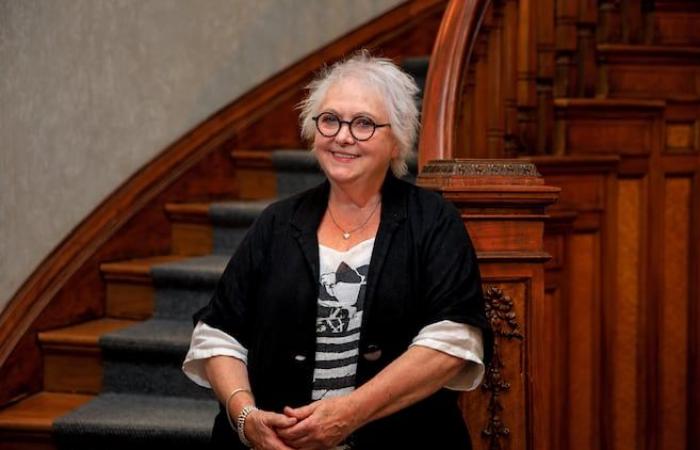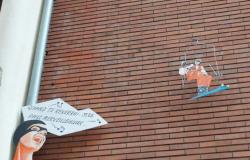“I am not tearing down my father, there is no hatred. There were still some beautiful moments,” says the 76-year-old writer and actress from Quebec in an interview with Soleil. Rather, she speaks of a “magnificent man who taught me to dance tango and bought me beautiful gifts” when she mentions the one who left her, her mother and her sisters when she was only seven years.
She also insists on saying that she grew up with a mother who never, at least not in front of her, spoke of the horrors of the man who had abandoned his wife and children to start a new life with another partner.
“She simply said of him: ‘This adorable unconscious’”, continues the writer who brought back Franchon, the little girl of My mother is a flamingowhich this time tells the story of his father with the adult Francine.
“When I was 12, I wanted to write about my mother and, ultimately, I am very happy that I waited until I was a mother myself to do it. I didn’t think I would write about my father, but one day I made a joke saying he was a carrier pigeon because he was a traveling salesman.”
— Francine Ruel, about the title of her new novel
“Last year, I said to myself, I’m doing it,” she continues about her work which asks a lot of questions, including why a man can do this to his 32-year-old wife who already has five children. .
Imagine an absent father
Unlike her mother’s story, to tell the story of an absent father who did not attempt to reconnect with his family and whom she knew little, Francine Ruel had to imagine a little of what her life could have been like far from the his.
“In the book, Franchon asks a question, whether it would not be better to have a deceased father. This is because my father stayed in the same town as us, but never contacted us. So we were like a female dog about running into him because it could happen at any time,” she says about the man from whom she inherited blue eyes.
“It was not a fictionalized story that did me good,” Francine Ruel clarifies, however, indicating that this novel is an end point for her, admitting at the same time that she had felt relief at the death of her father’s father about twenty years ago. “When I closed the little door of the urn, I told myself that it was over, that I was not likely to see him again. I mourned there,” she adds about writing her last novel.
The novelist recalls that she knew that she had opened a bit of a Pandora’s box with Anna and the child-old man when she saw the long lines of people waiting to meet her at book fairs and talk to her after reading her novel.
“Many people have experienced similar situations, but it’s not the kind of thing they find easy to talk about. A gentleman from Saguenay told me: “You are lucky, you have the words to say it,” she remembers, adding that she also expects to receive a lot of testimonies following the publication of My father is a carrier pigeon.
“It’s a human situation: unfortunately there are parents who abandon their children.”
Ordinary people
Francine Ruel also maintains that she doesn’t really like talking about heroes and heroines, that she prefers to deal with ordinary people in her novels.
“Writing about heroes is not interesting, because they are perfect. My mother was not a heroine, but an ordinary little woman. For me, it’s the little detail that comes to get me, the letter that isn’t lit in a neon sign, the way a person stands. Everyone has flaws, hidden things, that’s what’s fascinating about being human.”
The author tried to reconnect with this father who disappeared before his death, but the process was not crowned with success. “He had set conditions that I refused because they were despicable,” she comments about this attempt at reunion which she also addresses in her novel.
“He had erased us from the map of his life. I met a person who had worked with him very closely in his new life with his new partner and this person told me that she had never heard him talk about us.”
— Francine Ruel, about her father
Despite everything, Francine Ruel is not bitter. “In life, we have to do something with the tragedies that happen to us. I realized that the journey I took led me to become the author I am today. I created it!” continues the woman who sold nearly a quarter of a million copies of her tetralogy on happiness (What if that was happiness?, Cursed that happiness is expensive!, Happiness, are you there? et Happiness has passed this way).
Projects
On the other hand, the ink is not yet dry on her new novel, the writer admits to working on other projects, the details of which she does not reveal, but which do not concern writing. Perhaps theater for the one who returned to the stage after 20 years in 2023 in the play Madly.
But does the Donatienne of Cormorant and the Léonne of Scoop bored of TV? “People ask me why they don’t see me on TV anymore, but I have to tell them that I don’t refuse any role: they don’t call me!” she laments.
“There are no roles, there are three women in Montreal who play grandmothers and that’s it!”
— Francine Ruel, on the difficulties for an actress to obtain roles at 76
Francine Ruel then cites the great Simone Signoret, who died at age 64 in 1985 and who had difficulty obtaining roles in her sixties. “They say that on the small and big screen, men mature and women age…” concludes this always deeply human artist.






